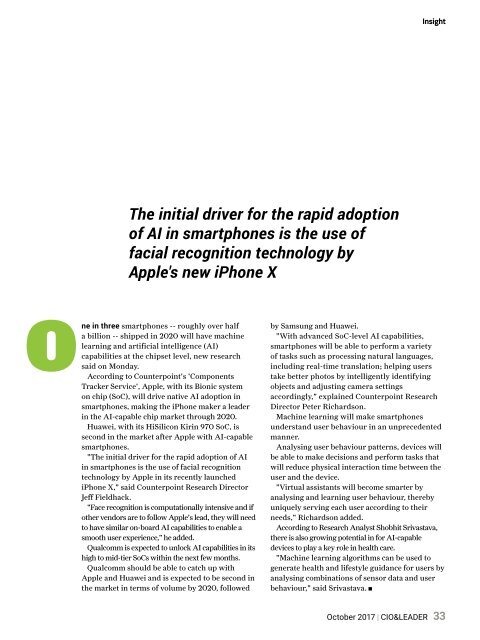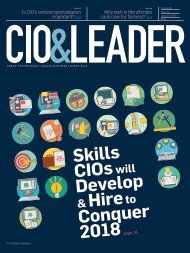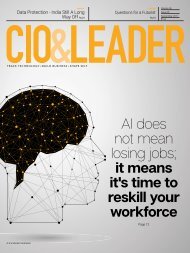C&L October 2017_LR (5)
You also want an ePaper? Increase the reach of your titles
YUMPU automatically turns print PDFs into web optimized ePapers that Google loves.
Insight<br />
The initial driver for the rapid adoption<br />
of AI in smartphones is the use of<br />
facial recognition technology by<br />
Apple's new iPhone X<br />
O<br />
ne in three smartphones -- roughly over half<br />
a billion -- shipped in 2020 will have machine<br />
learning and artificial intelligence (AI)<br />
capabilities at the chipset level, new research<br />
said on Monday.<br />
According to Counterpoint's 'Components<br />
Tracker Service', Apple, with its Bionic system<br />
on chip (SoC), will drive native AI adoption in<br />
smartphones, making the iPhone maker a leader<br />
in the AI-capable chip market through 2020.<br />
Huawei, with its HiSilicon Kirin 970 SoC, is<br />
second in the market after Apple with AI-capable<br />
smartphones.<br />
"The initial driver for the rapid adoption of AI<br />
in smartphones is the use of facial recognition<br />
technology by Apple in its recently launched<br />
iPhone X," said Counterpoint Research Director<br />
Jeff Fieldhack.<br />
"Face recognition is computationally intensive and if<br />
other vendors are to follow Apple's lead, they will need<br />
to have similar on-board AI capabilities to enable a<br />
smooth user experience," he added.<br />
Qualcomm is expected to unlock AI capabilities in its<br />
high to mid-tier SoCs within the next few months.<br />
Qualcomm should be able to catch up with<br />
Apple and Huawei and is expected to be second in<br />
the market in terms of volume by 2020, followed<br />
by Samsung and Huawei.<br />
"With advanced SoC-level AI capabilities,<br />
smartphones will be able to perform a variety<br />
of tasks such as processing natural languages,<br />
including real-time translation; helping users<br />
take better photos by intelligently identifying<br />
objects and adjusting camera settings<br />
accordingly," explained Counterpoint Research<br />
Director Peter Richardson.<br />
Machine learning will make smartphones<br />
understand user behaviour in an unprecedented<br />
manner.<br />
Analysing user behaviour patterns, devices will<br />
be able to make decisions and perform tasks that<br />
will reduce physical interaction time between the<br />
user and the device.<br />
"Virtual assistants will become smarter by<br />
analysing and learning user behaviour, thereby<br />
uniquely serving each user according to their<br />
needs," Richardson added.<br />
According to Research Analyst Shobhit Srivastava,<br />
there is also growing potential in for AI-capable<br />
devices to play a key role in health care.<br />
"Machine learning algorithms can be used to<br />
generate health and lifestyle guidance for users by<br />
analysing combinations of sensor data and user<br />
behaviour," said Srivastava.<br />
<strong>October</strong> <strong>2017</strong> | CIO&LEADER<br />
33














